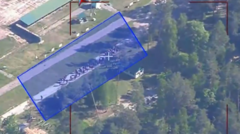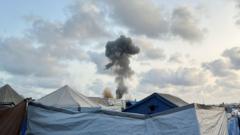Vladimir Putin's recent trip to the Kursk region, his first since Ukrainian troops withdrew, underscores Russia's efforts to stabilize the area while addressing the humanitarian crisis stemming from the war.
Putin's First Visit to Kursk Since Ukrainian Forces Retreat

Putin's First Visit to Kursk Since Ukrainian Forces Retreat
Russian President aims to project stability in Kursk amidst ongoing conflict and displacement issues.
President Vladimir V. Putin of Russia made his inaugural visit to the Kursk region this week, marking his first trip since Ukrainian forces retreated from a significant portion of the territory they had occupied. This visit comes in the wake of a surprise invasion last year, where Ukrainian troops managed to temporarily gain control over approximately 500 square miles of Russian land.
On Wednesday, the Kremlin announced that Putin had toured a nuclear power plant in the region, fulfilling a public relations effort to communicate a sense of normalcy amid persistent conflict. Photos from Russian state media showcased the president's interaction with local volunteers aiding residents affected by the war.
The incursion initiated by Ukrainian forces in August had initially seen swift territorial gains. However, due to increased Russian troop deployments and assistance from North Korean forces, Russia was able to reclaim most of Kursk by March following a counteroffensive.
Despite this military recovery, the consequences of the fighting have been severe, with the Russian government reporting nearly 300 civilian fatalities and over 110,000 residents displaced. This strife has undermined the Kremlin's attempts to characterize the situation in Ukraine as a limited operation.
Putin's administration has kept civilian casualty figures vague, complicating efforts by independent observers to assess the full impact of the war. Many displaced residents have expressed frustration over a perceived lack of governmental support and societal indifference to their plight.
During his visit, Putin engaged with local officials, pledging to provide financial assistance equating to $800 per month for residents in border settlements. This commitment appears aimed at alleviating concerns over the humanitarian crisis exacerbated by the ongoing conflict, as the region remains a focal point in the protracted war with Ukraine.



















